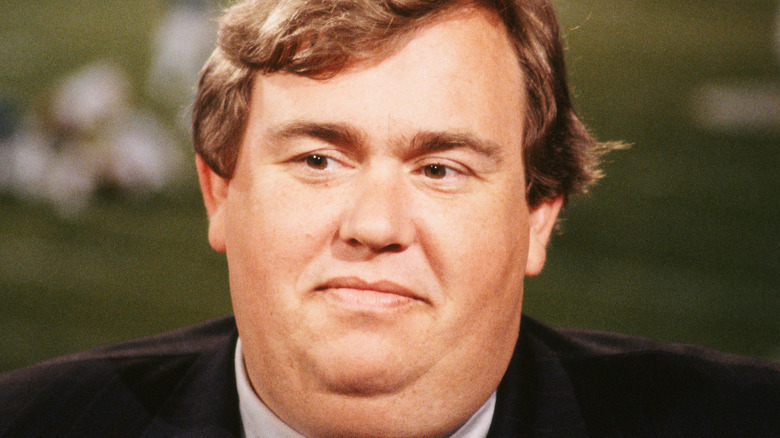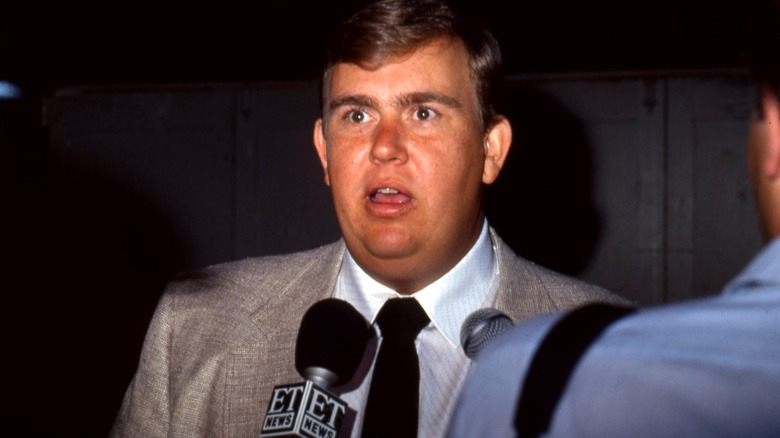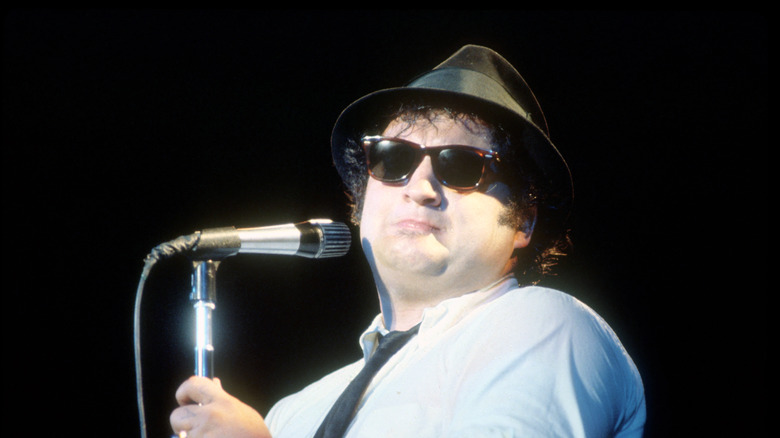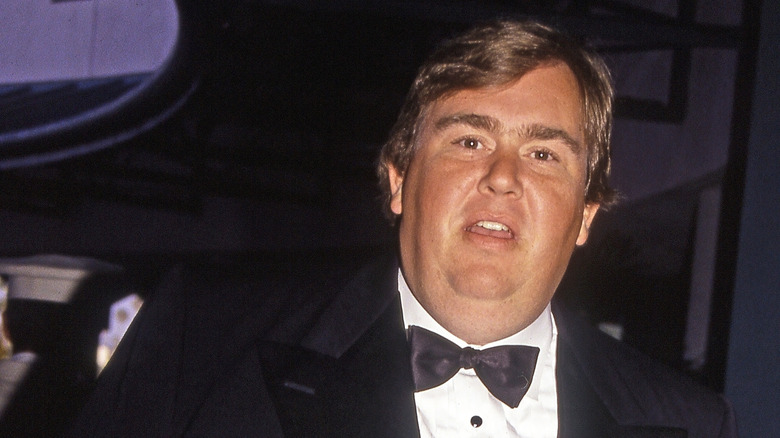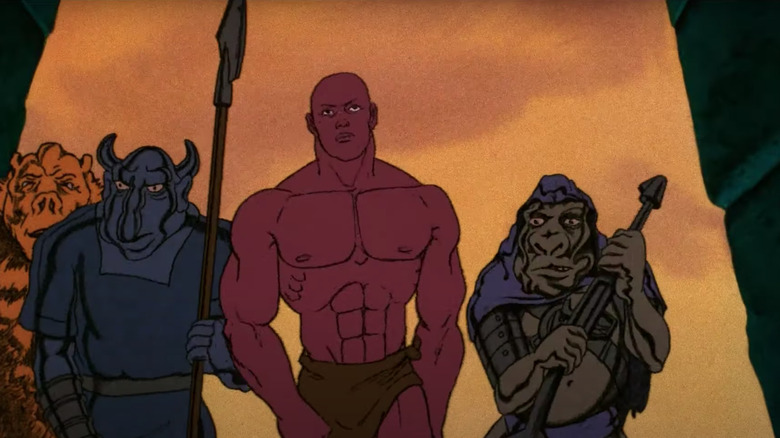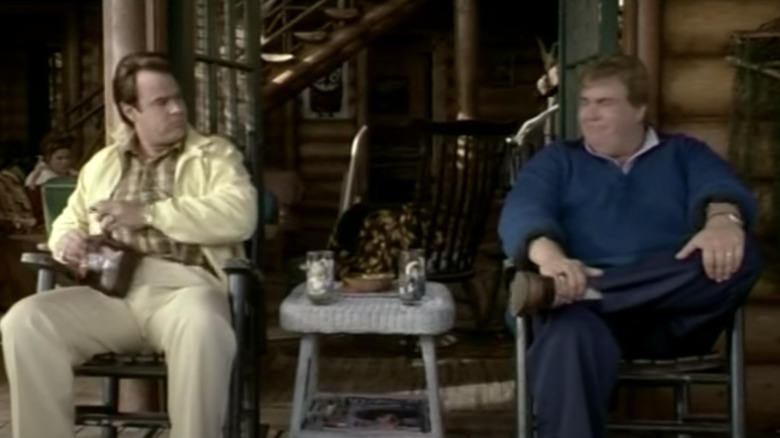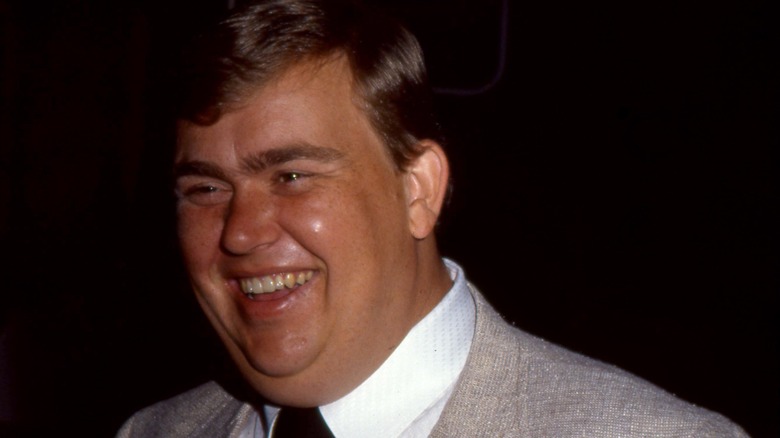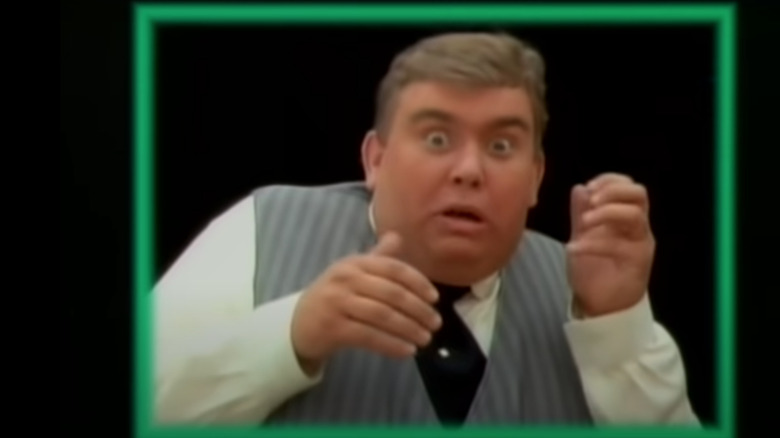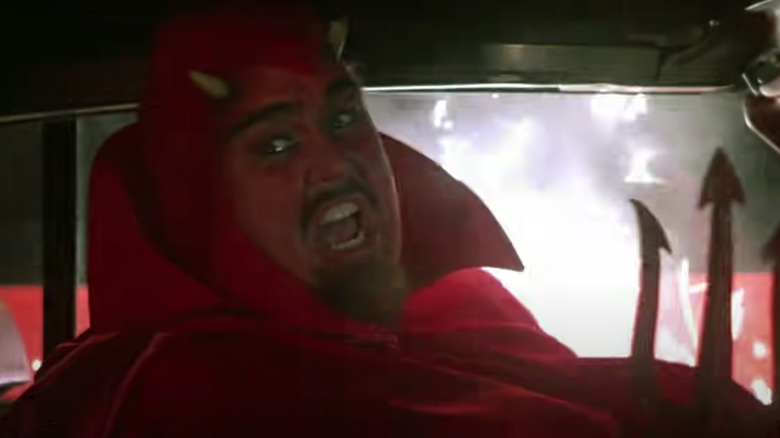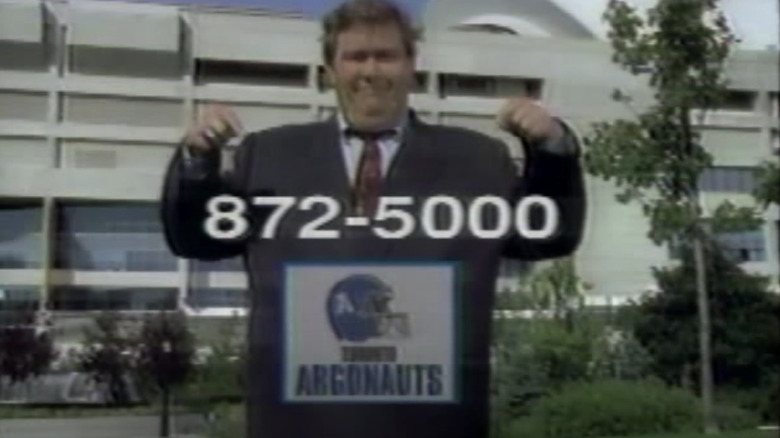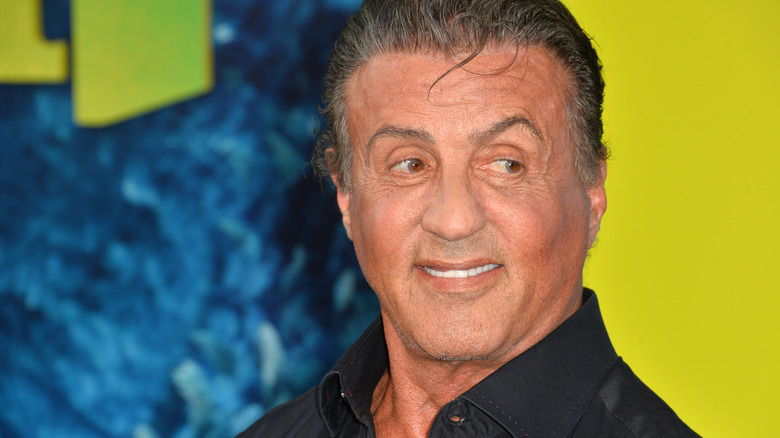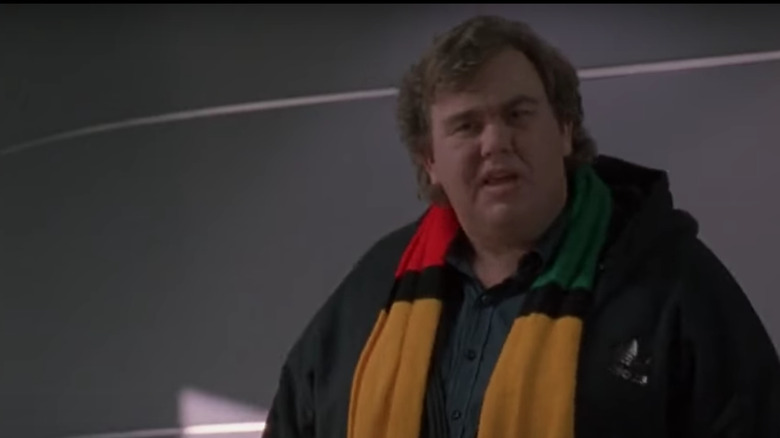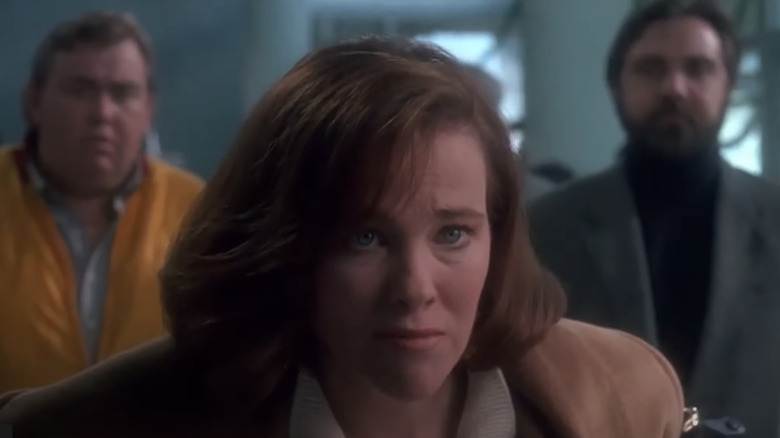The Untold Truth Of John Candy
We may receive a commission on purchases made from links.
He was called an "international treasure," and indeed, John Candy is still beloved some 30 years after his death at the age of 43. He not only made audiences laugh, but by most accounts he was a good man with a big heart. Candy treated his Hollywood peers with affection, his fans with kindness, and his chosen profession with respect — and that could be felt through the big personality he projected on screen in dozens of movies.
Born on Halloween night in 1950 in Newmarket, Ontario, Canada, Candy made his breakthrough alongside the likes of Eugene Levy, Bill Murray and Catherine O'Hara on "SCTV," then he became a movie star via films like "Stripes," "Uncle Buck," and "Spaceballs," to name a few.
Candy's comedy had great pathos — in one of best loved films, "Planes, Trains and Automobiles," he played a character initially grating, but endearing as the film goes on — and this humanity Candy brought to bear set him apart from his peers. When he died, he seemed to be dipping his toes in dramatic waters, crafting a small but memorable character in Oliver Stone's "JFK," which he would call the most important performance of his career.
There's much more to the story of John Candy, however, than what you've seen on screen.
He worked hard to make healthier choices in life
Candy was a larger-than-life comedian. He was 6'3" and sometimes weighed as much as 350 pounds (his typical weight was around 275). Candy was aware of his health issues, and at times strove to make healthier choices in life.
Candy's father died of heart disease at 35, and his brother suffered a heart attack as well. With his family history looming over him, Candy went on diets, and worked with trainers to attempt to get in better shape. "I know what I have to do if I want to lose weight and stay healthy: eat a proper diet and exercise," he said in 1994. "All I've got to do is apply it."
At one point, it seemed to be working. Candy went on so-called "Pritikin Diet," losing some 75 pounds in a summer. "He always worked on his weight and his health," his son Chris would say after his death. "He had trainers and would work at whatever the new diet was. I know he did his best."
Like many actors, Candy had trouble watching himself on screen, and would ask his wife to go to screenings in his place; she would dutifully report back to him whether the audiences thought he was funny or not.
John Belushi's death was a shock
Candy came of age in an era where comedians partied like rock stars; at the time, no one was living harder than John Belushi, another large-bodied comedian who built a reputation on being the type of guy you'd love to party with. Candy had worked with Belushi in both the Steven Spielberg dud "1941" and the John Landis classic "The Blues Brothers." So, when Belushi died of an overdose on March 5, 1982, it was a real shock.
"Candy was so devastated by Belushi's death that he sank in a deep depression," writes author Martin Knelman in the biography "Laughing on the Outside," released two years after Candy's death. "[He was] refusing to go out or even talk to anyone on the phone."
As reported in the '70's film history "Easy Riders, Raging Bulls," Belushi's death was a big moment where, as "Taxi Driver" screenwriter Paul Schrader put it, "the game was up ... the rules had changed."
Candy wasn't the only comedian rattled by Belushi's death. Robin Williams, who was partying with Belushi right before he died, was also terrified by the event, and cleaned up his act. "That sobered the sh-t out of me," Williams could be seen saying in an archived clip used in the 2018 documentary "Robin Williams: Come Inside My Mind." "[Belushi's] death scared a whole group of show-business people. It caused a big exodus from drugs."
He turned down SNL
You'll often see Candy's name on lists of famous people who have turned down being on "Saturday Night Live," and he did indeed decline becoming a cast member of television's most enduring sketch show.
Candy first broke through as part of "SCTV," and was such an important component to the show tat he feared being the catalyst for some sort of feud.
Candy was reportedly approached (per Mental Floss) when "SNL" was in turmoil. The original cast was gone by 1979, producer Lorne Michaels had left the show, and as we now know, there would be some lean years before "SNL" would find its footing again.
Candy was approached during this period by Dick Ebersol, who produced "SNL" at the time. The funnyman reportedly declined because, as the unauthorized SNL history "Saturday Night" put it, the comedian "was mortified at being caught in the middle of the tug of war between ["SNL"] and 'SCTV.'"
Candy stayed loyal to Second City Television (although he did host "SNL" on October 22, 1983 and made the occasional cameo), remaining through various iterations (1976-1981's "Second City TV," 1981's-1983's "SCTV Network 90," and 1983-1984's "SCTV Channel") until "SCTV" effectively went off the air in 1984.
He played a gym rat hero in Heavy Metal
Nobody ever confused John Candy with Arnold Schwarzenegger, but many would be surprised to learn he played a muscle-bound hero in the animated film "Heavy Metal."
A 1981 animated movie adaptation of the famed adult fantasy magazine, "Heavy Metal," had artist Richard Corben creating a story that involved a warrior named Den, who rules a fantasy land full of mythical creatures and sexy women. In the story, Den is a nerd on earth, but in another dimension he's a serious stud.
"Heavy Metal" was by no means a kiddie film; it was an R-rated animated feature for adults, and like the magazine had nudity, adult language and drug humor. SCTV alumni Eugene Levy and Joe Flaherty also provided voices for the film, which has gone on to be a beloved midnight movie and cult classic.
Candy starred in 11 movies with SNL alumni
Although he was never technically one of them, show wise, Candy appeared in 11 movies with "SNL" alumni.
These collaborations began inauspiciously, with the 1976 anthology TV spoof "Tunnel Vision," which purported to present futuristic programming from the far-away year of 1985. In raunchy clips like "The Pregnant Man" and the Manson sitcom "Charlie's Girls," Candy appeared alongside folks like Howard Hesseman, Roger Bowen, and Betty Thomas, as well as "SCTV" fave Joe Flaherty and "SNL" Not Ready for Primetime Players Chevy Chase and Laraine Newman, most just beginning their film careers.
In 1979, Candy appeared with friend Belushi (now a big star, post "National Lampoon's Animal House") in Steven Spielberg's "1941," a comedy follow-up to "Jaws" and "Close Encounters of the Third Kind" that many still cite as Spielberg's worst film. As the '80s progressed and Belushi became a bigger star, "1941" led to "The Blues Brothers," pairing Belushi and Dan Aykroyd and casting Candy in a small-but-unforgettable role as the "Orange whip? Orange Whip? 3 Orange whips"-loving detective on their tail. 1981 also brought "Stripes," putting Candy in scene-stealing mode alongside Bill Murray, who at various times was involved in both Second City and "SNL."
In 1982, Candy and Aykroyd both anchored "It Came from Hollywood," a comedy/documentary that had the funnymen playing thinly-veiled versions of themselves while talking over old movies (a format that would prove popular a decade later with "Mystery Science Theater 3000"); Candy even hosted a tribute to Ed Wood. In 1983, Candy had a small but memorable role in "National Lampoon's Vacation," a Chevy Chase classic.
By 1985, Candy was a household name on his own, making memorable cameos in films like "Little Shop of Horrors" (which featured cameos from Bill Murray and frequent "SNL" host Steve Martin and starred Candy's "SCTV" buddy Rick Moranis). In the late '80s, Candy and Aykroyd were full-on leading men in "The Great Outdoors," and then teamed with Chevy Chase for "Valkenvania," a notorious project written and directed by Aykroyd that cast him and Candy in dual roles and was intended as a "Beetlejuice"-type film; over budget and panned by critics, it eventually limped into theaters in 1991 as the bomb "Nothing But Trouble."
Rounding out the list of films where Candy starred with "SNL" alumni, there's also the underrated comedy "Delirious," which had infamously-fired alumnus Charles Rocket in the cast, and "Canadian Bacon," directed by Michael Moore and marking one of his final roles, casting Candy alongside Jim Belushi.
He was funny in person
There's always a danger when you meet your heroes, and some comedians have gained reputations as being dour, unpleasant, and unhappy when cameras aren't rolling. People who worked with John Candy, however, claim that he really was as charming as you'd think, both on set and off.
Hanging out with friend/filmmaker Tom Mankiewicz (who directed "Delirious"), Candy would often slip into an agent character he had created.
"I asked Irving: You represented Frank Sinatra?" he recalled in his biography "My Life as a Mankiewicz: An Insider's Journey Through Hollywood" of their idle chatter during a long car ride. Candy replied in character: "'Represented him? I ... made him! And he comes out with he's gonna do this thing 'Wee Small Hours of the Morning.' I say, Frank, you're depressing people. Don't do it. Stay up, stay bright!'"
Mankiewicz couldn't stop laughing. "I was pounding the dashboard," he recalls. "If I had been driving the car, it would have gone out of control."
"John was how you thought he'd be," Martin Short recalled in 2021. "He was affable, he was funny, he was a brilliant comedian, a brilliant actor...He was always larger than life."
He turned down Ghostbusters
"Ghostbusters" is a landmark film, still impacting Hollywood blockbusters; film buffs love to discuss "What if?" possibilities, and in the years since the film's release, details have emerged that at various times, John Belushi, Eddie Murphy, and Candy were all up for the film.
While it's tantalizing to think of those three comedians in "Ghostbusters," the film did pretty well without them; Candy was up for the role of Louis Tully, which eventually went to his friend Rick Moranis.
On the 30th anniversary of "Ghostbusters," director Ivan Reitman recalled sending the treatment to Candy, who wasn't interested. "He didn't like the treatment that I had sent. He didn't get it. He said, 'Well, maybe if I played him as a German guy who had a bunch of German shepherd dogs...'"
For a moment, Reitman thought of letting Candy go there, but when it ultimately slipped to Moranis, he told Reitman: "Wow, please thank Candy for me. This is the greatest thing I ever read."
Always supportive of his friends, Candy did appear in the music video for the theme song, written and performed by Ray Parker Jr.
The devil suit in Planes, Trains and Automobiles was his idea
One of Candy's best regarded films is "Planes, Trains and Automobiles"; directed by John Hughes, it has become a holiday classic. As it turns out, one of the film's funniest gags in the film was proposed by Candy.
In "Planes," Candy and Steve Martin are "Going the wrong way!" on the freeway when their car scrapes between two huge trucks, narrowly avoiding a head-on collision. At one point, Martin looks over and sees Candy as the devil, laughing maniacally.
At that point in the shoot, the movie was reportedly over budget and over schedule, and the studio brass were there, trying to get things on track.
"My dad had the idea that it would be funny if Steve saw Del as the devil," Candy's son Chris recalled in 2016. "So [the Paramount executives] get on set and Dad is walking around in this devil costume, and they're like, 'What the hell does this have to do with anything?!'"
He co-owned a football team
One aspect of Candy's life many are not aware of is that he owned a sports team. A big fan of football, at one point he even had dreams of being a professional football player until a high school injury derailed them.
In 1991, Candy, millionaire Bruce McNall and hockey legend Wayne Gretzky launched an effort to bring US stars to Canadian football, purchasing the Toronto Argonauts. McNall owned the lion's share of the team, 60 percent, and Candy and Gretzsky owned 20 percent each. Candy loved the team and the players, and by all accounts took his role as a co-owner very seriously, even appearing in advertising.
Despite winning the Grey Cup under their ownership in 1991, by 1993 the team was going broke, and McNall would eventually wind up in jail on charges of fraud. McNall sold the team out from under Candy, which the comedian found out about while shooting his last movie, "Wagon's East."
"The actor was in costume, wearing a scruffy beard and a big cowboy hat, standing on a dusty desert plain when he took the call from McNall's business manager on a large satellite phone," wrote the Toronto Star in a 2021 remembrance of Candy's ownership.
"I wouldn't go so far as to say the color went out of his face, but it was close," the paper quotes Bob Crane Jr., Candy's stunt double/trainer/assistant, who stood nearby as Candy absorbed the news. "This was a cold, corporate, 'we're dumping this.' He deserved better than that."
He almost made a movie with Sylvester Stallone
John Candy and Sylvester Stallone seem like an odd combination, but they indeed almost starred in a film together.
For much of the '80s, the "Rambo" star had been in close competition with Arnold Schwarzenegger. So, when the latter successfully reinvented himself as a funnyman for the 1988 hit comedy "Twins," Stallone was eager to punch back. The result would eventually become 1991's "Oscar" and 1992's "Stop! Or My Mom Will Shoot." Since both were seen at the time as career-threatening bombs, perhaps he should have instead gone with a third project he'd been considering: "Bartholomew vs Neff."
Written by longtime Candy pal John Hughes (who had hopes to direct) and set up at Carolco Pictures (at the time bankrolling "Terminator 2: Judgment Day"), the script concerned feuding neighbors; Stallone would be cast as a former baseball player, while Candy would play a corporate banker.
"I am very excited about working with a director with the stature of John Hughes," Stallone told the Cincinnati Enquirer in 1990 about the film which — natch — would have been shot in a suburb of Chicago. "I have long been a fan of his films, which capture the truly comic side of everyday life."
But timing is everything, and when Hughes released "Home Alone" in 1990 (with a Candy cameo) and it became a huge smash, a sequel was quickly set up, putting "Neff" on the backburner so the adventures of Kevin McAllister could continue. The writer/director would eventually lose interest in "Neff" and walk away from it, making it one of many Hughes projects that would never reach the big screen.
He went to a wild college with several SCTV alumni
A lot of great comedy has grown out of college experiences, from "National Lampoon's Animal House" to "Old School"; Candy went to McMaster University, where many of his "SCTV" alumni went as well.
Martin Short, Eugene Levy, Dave Thomas, Ivan Reitman and Candy all went to McMaster, which is located in Hamilton, Ontario Canada. (Short, Levy and Thomas are all Hamilton natives.)
Candy lived at Whidden Hall, which reportedly had a wild reputation for student behavior. In fact, when Ivan Reitman was putting together "Animal House," he drew on some of his McMaster memories for the film.
In the early '70s, USC had a group of film students who went on to great success, including George Lucas, John Carpenter and Robert Zemeckis; McMaster, it seems, was a similar breeding ground at the time for the future of comedy.
He did his Home Alone cameo for less than $500
"Home Alone" is best known for making a big star out of Macaulay Culkin, so it's easy to forget that Candy had a cameo role in the Scranton airport (supposedly alongside Elvis), playing polka star Gus Polinski.
Candy had a strong relationship with writer/director John Hughes following roles in "Vacation" (which Hughes wrote), "Uncle Buck" and "Planes, Trains and Automobiles" (both of which he wrote and directed), and Hughes originally came calling with a deal that could have potentially given Candy one of the biggest paydays of his career. As it turns out, however, he only made scale for the role, reportedly $414.
The sequence, opposite Candy's old "SCTV" friend and fellow improv expert Catherine O'Hara, was largely improvised. As O'Hara's frantic mother encountered the jovial "Polka King of the Midwest," director Chris Columbus recalled years later that he and Hughes were thrilled.
"We could barely keep a straight face on set just listening to John," said Columbus in 2020. "None of that stuff was in the script ... The funeral-parlor story, that was all improvised at 4:30 in the morning."
Hughes originally offered Candy a slice of the profits for his troubles, but Candy, who was known for being generous, showed up simply as a favor to Hughes, taking scale. Because he demurred the profit participation deal, and "Home Alone" went on to become one of the highest-grossing films of its period (making $476 million worldwide), Candy lost out on millions.
